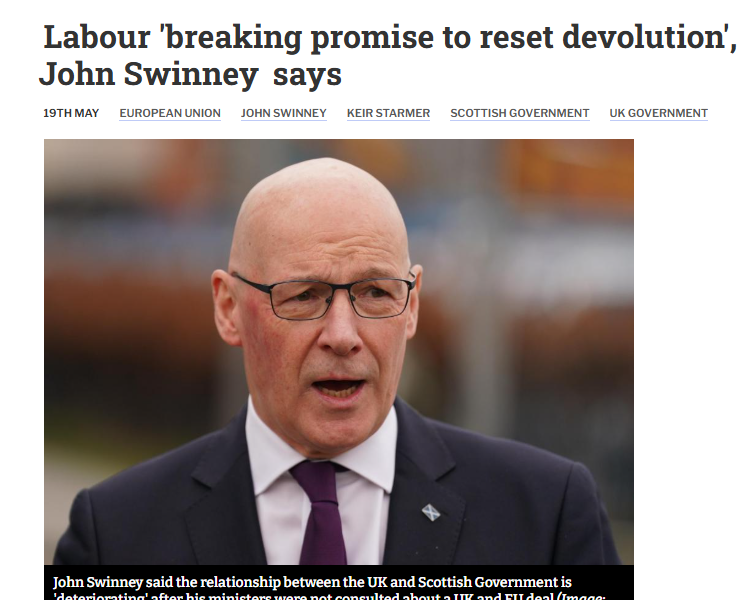On Monday, the presidents of the EU Commission and Council, Ursula von der Leyen and António Costa, were hosted by UK Prime Minister Keir Starmer in London for a UK–EU Summit. They committed to closer cooperation on security, extended an agreement that gives EU fishermen access to British water, and announced a plan to cut red tape for food imports and exports.
A document of “Common Understanding” furthermore announced aspirations for future cooperation across a range of issues, including the prospect that the UK may potentially rejoin the Erasmus programme, which would be very welcome indeed. The exact nature and timeline for such goals remains unclear and are left for future negotiations.
In England, the agreement was immediately trashed by Nigel Farage, Kemi Badanoch and the tabloid press as a betrayal of Brexit, while European voices sounded relieved that the UK government is no longer openly hostile towards the EU (a sentiment already expressed when Rishi Sunak’s government agreed on the Windsor Framework in 2023).
The Scottish government, meanwhile, expressed rightful anger that it hadn’t been consulted over this deal, not even on the devolved matter of fisheries. Neither Scotland, nor Wales, nor Northern Ireland have been invited to take part in future negotiations—a constant of the Brexit saga, and a position shared by all UK governments since 2016, whether Conservative or Labour.

For our part, we welcome this timid step in the right direction, but are also frustrated that the Starmer government keeps being determined to put a gloss on a failed policy rather than admit the true costs of Brexit—costs that this new agreement barely begins to address.
Indeed we are nowhere near the end of Brexit. On the contrary, as rejoining the single market has been categorically ruled out by Starmer, this new deal will just be just the beginning of yet another chapter of never-ending negotiations, and it remains to be seen whether Starmer will last long enough in government to conclude even these relatively modest plans, particularly if we agree with what Kirsty Hughes said to us last October that it’s very unlikely Starmer will be braver than this on Europe.
The absence of a larger vision that can be seen in this timid agreement can in many ways be linked to the fundamental weakness of Keir Starmer’s premiership.
First, his position on Brexit has been ambivalent to say the least—backing free movement in the 2020 campaign only to reverse course the year after, telling the BBC there was “no case” for reopening the Brexit deal. Since then, Starmer has ruled out rejoining the EU, the Single Market, or the Customs Union—even as polls consistently show the public regretting Brexit.
Although it appears that he has now backtracked on his previous rejection of the EU’s Youth Mobility Scheme—a proposal that would allow a limited number of young people to live and work across borders—he now timidly refers to it as an “experience” with details yet to be agreed.
And just last week, on 12 May 2025, Starmer doubled down:
“Today, this Labour Government is shutting down the lab. The experiment is over. We will deliver what you have asked for – time and again – and we will take back control of our borders.”
He went on to warn that without tougher immigration rules, the UK risked becoming “an island of strangers.”
His rhetoric and hardline policies echoes those more commonly associated with the far right. In fact, just three days later, Starmer flew to Albania in an attempt—ultimately unsuccessful—to imitate aspects of Italian far right leader Giorgia Meloni’s failed immigration policy.
It’s therefore not surprising, from our perspective, that Labour’s vote has sunk dramatically since last year’s election and that support in Scotland for independence in the EU has skyrocketed in recent times.
But here’s what we can tell you: whatever the UK Government does and whoever leads it, there is genuine goodwill for Scotland within the EU.
We know this because we’ve spoken with MEPs in person. Want to hear it for yourself? Click here:
You can hear messages from current MEPs that “would love to have Scotland back in the EU” and other Brussels actors, presented on Europe day in Edinburgh and recorded during our mission to Brussels on 9 April, joined by our friends at Yes for EU and former Scottish MEPs Heather Anderson and Alyn Smith.
The message is clear. As MEP Thomas Waitz put it, Scotland would receive “a big welcome” should it want to rejoin the EU.
Tell your friends, tell the sceptics. And if they don’t believe you, show them the video.
Because when hope runs low, it helps to remember: another way is possible.
We Europeans stand with Scotland.
With European solidarity,
EfS team